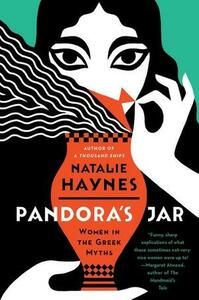Take a photo of a barcode or cover
just fell off with it and it had been so long since i last read it that at that point i just need to reread it entirely
adventurous
funny
informative
reflective
fast-paced
dark
informative
reflective
funny
informative
reflective
fast-paced
If you're already familiar with the hegemonic Greek myths, reading about them from the "other side" is quite a fun experience. The book also showcases the importance of interpretation in the way we understand history. I believe the most profound point Haynes makes is that some of these stories have actually grown more misogynist over time as we choose to remember the most sexist myths out of hundreds of variations within an unregulated oral tradition.
dark
informative
slow-paced
As can easily be gleaned from my reading history, I do love me some Greek myth retellings. I've heard Natalie Haynes speak and be interviewed on several history podcasts I listen to, and she's always come across as bright, bubbly, funny and extremely knowledgeable about her specialist subject, so I thought I'd give this book a go, simply to get me a little more up to speed with the women of the Greek myths and to obtain a more female-centric view of them.
From very early on, the phrase that stuck in my head was 'stream of consciousness'. The writing is interesting and thought-provoking, but it makes for breathless reading - it came across to me as if the author simply couldn't type the words out quickly enough to keep up with her thought process. One line of examination flowed seamlessly into another; while in general that's a good thing, it made it very difficult to discern the point she was making.
The language used clearly puts this book well within reach of a general audience, but at the same time this is not a book to pick up if you only have a passing knowledge of the women and the myths studied. I class myself in that category - I could place most of the women in the right 'place' in the myths, but aside from that my awareness is in fact relatively limited. As a result, once again it became very hard to keep track of exactly what the author was trying to say - it was only with the last couple of women studied that a clearer recap of their 'standard' stories was included. Otherwise, it felt very much like being thrown in at the deep end, and therefore perhaps more appropriate for those with more expertise. I though this was a shame, as if matters were drawn out a little more I think it would have made a truly fascinating read.
Because of both these elements, I found it a harder going read than expected; for a fairly short book, it was quite heavy-going. I could only digest it for about 20 minutes at a time before the weight became too much and my attention started to drift. I think this would be an incredibly useful reference book if you were studying a particular myth or work such as the Iliad, as it would counter the male gaze of the main story and allow you to consider an alternative perspective. Likewise, if you were focused on one particular female from the pantheon, you might find her chapter in here a great source of information. But otherwise it's just not got that hook to make it a 'must read'.
From very early on, the phrase that stuck in my head was 'stream of consciousness'. The writing is interesting and thought-provoking, but it makes for breathless reading - it came across to me as if the author simply couldn't type the words out quickly enough to keep up with her thought process. One line of examination flowed seamlessly into another; while in general that's a good thing, it made it very difficult to discern the point she was making.
The language used clearly puts this book well within reach of a general audience, but at the same time this is not a book to pick up if you only have a passing knowledge of the women and the myths studied. I class myself in that category - I could place most of the women in the right 'place' in the myths, but aside from that my awareness is in fact relatively limited. As a result, once again it became very hard to keep track of exactly what the author was trying to say - it was only with the last couple of women studied that a clearer recap of their 'standard' stories was included. Otherwise, it felt very much like being thrown in at the deep end, and therefore perhaps more appropriate for those with more expertise. I though this was a shame, as if matters were drawn out a little more I think it would have made a truly fascinating read.
Because of both these elements, I found it a harder going read than expected; for a fairly short book, it was quite heavy-going. I could only digest it for about 20 minutes at a time before the weight became too much and my attention started to drift. I think this would be an incredibly useful reference book if you were studying a particular myth or work such as the Iliad, as it would counter the male gaze of the main story and allow you to consider an alternative perspective. Likewise, if you were focused on one particular female from the pantheon, you might find her chapter in here a great source of information. But otherwise it's just not got that hook to make it a 'must read'.
Moderate: Adult/minor relationship, Child death, Death, Domestic abuse, Emotional abuse, Incest, Infidelity, Misogyny, Rape, Self harm, Sexism, Sexual assault, Suicide, Toxic relationship, Violence, Blood, Kidnapping, Grief, Suicide attempt, Murder, Abandonment, War, Injury/Injury detail
Minor: Animal cruelty, Animal death, Pregnancy
challenging
informative
inspiring
reflective
sad
slow-paced
adventurous
challenging
dark
emotional
informative
slow-paced
informative
reflective
medium-paced
I really enjoyed learninf about Medusa, Medea and Clythemnestra. It was really mind-blowing to hear other versions of the greek myths, where women took the lead and are rightfully analysed.
I listened to the audio book and the author has a soothing voice and has a great sense of humour. Her frequent references to pop culture and modern times also make the book very accessible.
I listened to the audio book and the author has a soothing voice and has a great sense of humour. Her frequent references to pop culture and modern times also make the book very accessible.







